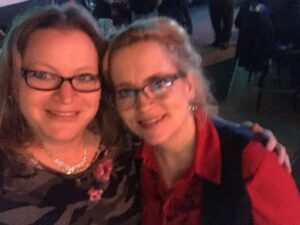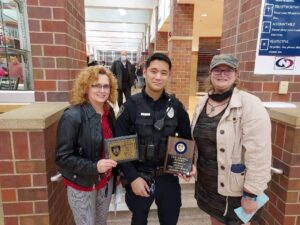By Gina Mayfield

Julie (left) and Rhonda (right)
On a warm September evening, Rhonda Kuehn arrived at the home of her longtime friend, Julie, for a cookout to celebrate her birthday. Shortly after arriving, Rhonda realized the 46-year-old birthday girl was noticeably absent and asked about her. Julie’s husband casually mentioned Julie felt overheated and had started to experience some chest pains, and that she had stepped away to rest privately.
“I went and fixed my dinner plate, and then I said to myself, ‘Well, no, I’m going to go check on her,’” Rhonda says. She found Julie with a cold towel wrapped around her neck and a fan blowing on her. “I asked her what her symptoms were, input them into the WebMD app on my phone and the results came back as a high possibility of a heart attack,” Rhonda says. “So we got in the car and started heading toward the hospital.” The American Heart Association recommends calling 911 for a suspected heart attack and does not recommend driving to the hospital.
On the way there, Rhonda tried to make lighthearted conversation, but it quickly became clear that Julie was in a lot of pain. “She had her phone in her hand and just dropped it, then she was leaning over, and I just shook her a little bit,” Rhonda says. “I said, ‘Jules, Julie…‘ No response whatsoever. Then I missed the turn to the hospital.”
Rhonda turned another corner into a residential area and called 911. The dispatcher told her she needed to start chest compressions right away and asked if she could get Julie out of the car, which wasn’t possible. “Then Julie’s lips started turning blue and she wasn’t breathing,” Rhonda says. “The dispatcher told me to go over and lay Julie’s seat as far back as I could, straddle her lap and start doing compressions. The dispatcher talked me through it, she kept encouraging me.” Chest compressions should be done on a firm, flat surface when possible.
After missing that turn, Rhonda didn’t know what street she was on, so the dispatcher struggled to pinpoint a location for first responders. “I’m facing the street as I’m doing compressions, and I see the ambulance pass us by, then the fire engine,” Rhonda says. At that point she starts doing compressions with one hand and honking the horn with the other in an effort to get the attention of local residents. No help came.
Finally, a police officer spotted them and ran over to help get Julie on the ground and take over compressions. By this point, onlookers had started appearing on their front lawns and Rhon

Rhonda, first officer on the scene Cory Contreras, and Julie (left to right)
da asked them to flag down the ambulance at the street. EMTs arrived, used a defibrillator, and rushed Julie to the hospital where she spent days in intensive care and left with a device implanted in her heart that can be monitored. “They did all kinds of testing and found no reason for her to have a cardiac arrest,” Rhonda says. “It’s still a mystery.”
What’s not a mystery, is that Rhonda’s actions that day saved her friend’s life. Many years earlier she had taken a CPR class at a local community college in their hometown of Lincoln, Nebraska, and that experience came back to her right when she needed it.
In the days, weeks and months that followed, the thanks came pouring in from Julie and her friends and family, including a card from Julie’s sister. “She sent me a picture of her siblings and nieces and nephews and wrote, This is the family that thanks you for saving our sister,” says Rhonda, who’s quick to point out the others who helped too, including that 911 dispatcher. “She talked me through it and kept me from getting emotional,” Rhonda says. “Julie has thanked me over and over, but there’s appreciation that needs to go all the way around. It’s definitely not a one-person thing. It’s just a big team that made it possible.”
Julie and Rhonda got to meet that dispatcher in person, along with the local fire and rescue team, as well as the police officer who was first on the scene. Then one day a letter came in the mail from the Lincoln, Nebraska, police department. “When I first got it, I thought, Oh my goodness, what did I do?,” Rhonda says. But instead of a citation, it was an invitation – to a ceremony honoring citizens who had saved a life.
The AHA is committed to transforming a nation of bystanders into a Nation of Lifesavers. Join the movement that can make a difference in the life of someone’s partner, parent, friend, or family.